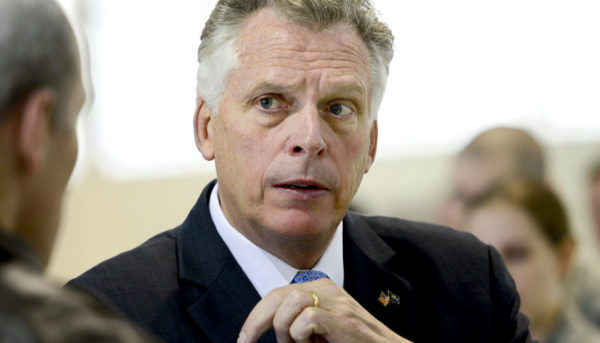
Responding first to the question, Republican candidate Glenn Youngkin raised the issue of “school systems refusing to engage with parents,” offering the recent example of parents in Fairfax County, Va., who were unaware of sexually explicit content in books available to children at the school library.
“You believe school systems should tell children what to do,” Youngkin said to McAuliffe. “I believe parents should be in charge of their kids’ education.”
In response, McAuliffe said, “I’m not going to let parents come into schools and actually take books out and make their own decisions,” adding, “I don’t think parents should be telling schools what they should teach.”
Asked in a subsequent interview whether parents should have buy-in on a school’s curriculum, McAuliffe doubled down: “Listen, we have a board of ed working with the local school boards to determine the curriculum for our schools.
You don’t want parents coming in every different school jurisdiction saying, ‘This is what should be taught here’ and, ‘This is what should be taught here.’
Ah, yes — those meddlesome parents.
It is understandable, given the blowback against their policies in localities around the country, that progressives want to be done with concerned parents showing up at school-board meetings and protesting CRT, transgender radicalism, and inappropriate sexual material. Worse, some of these parents are running for school boards — and winning.
Of course, this is exactly as it should be. Parents know the most about their kids, care the most about their kids, and have primary responsibility for raising their kids.
They should never simply trust — unchecked — educators, administrators, and experts to make important decisions about what is taught to their kids and how their schools are run.
Indeed, it is the beauty of our decentralized education system that they don’t have to.
Locally run school systems provide parents broad access to influence how their children are taught, whether through the PTA or elected school boards.
But McAuliffe evidently isn’t enamored with the mechanisms of democratic accountability and grassroots input. Like all progressives, he has a highly inflated view of the competency and authority of government bureaucrats.
And he, of course, sides with the school boards and administrators in Virginia working to cram critical race theory into classrooms, over and against parent protest.
It’s not just CRT.
Just last month, the school board in Loudoun County, Va., ignoring passionate complaints from parents and teachers, enacted a permissive gender-identity policy, which allows students to use restrooms and locker rooms, as well as compete in sports, on the basis of the gender with which they identify rather than their biological sex.
These extreme policies are bad enough if enacted with parent input or over parental objections. They’d be even more egregious if the parents were shut out entirely as interlopers, as McAuliffe portrays them.
The former Texas senator Phil Gramm used to illustrate what should be the primacy of parents in education by telling the story of an educator who insisted she cared about his kids as much as he did. Gramm’s rejoinder was, “Okay: What are their names?”
Now, Terry McAuliffe has a comeback for Gramm and all parents who think like him — shut up and fall into line.
THE EDITORS comprise the senior editorial staff of the National Review magazine and website.






